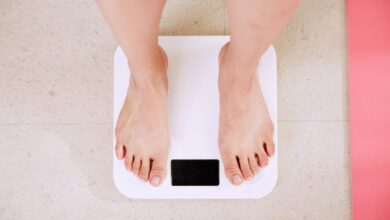5 Mistakes That Are Stopping Your Fat Loss

So, you’re working hard to lose fat, but the scale isn’t budging? It can be frustrating! As a nutrition and fitness blogger, I’ve seen this happen to so many people. Often, it’s not about a lack of effort, but rather falling into common pitfalls that sabotage your progress. Let’s break down five mistakes that might be standing between you and your fat loss goals.

Mistake #1: Underestimating Your Calorie Intake
This is HUGE. It’s so easy to underestimate how much you’re actually eating. Those little bites here and there, that extra drizzle of olive oil, the handful of nuts – they all add up! Our brains are wired to minimize, especially when it comes to less healthy choices.
The Fix: Start tracking your food meticulously for at least a week. Use a food tracking app like MyFitnessPal or Lose It!. Be honest with yourself, even about the small stuff. Weigh your food for accurate portion sizes, especially things like nuts, oils, and sauces. You might be surprised by what you discover!
Mistake #2: Not Eating Enough Protein
Protein is your best friend when it comes to fat loss. It helps you feel full and satisfied, which can prevent overeating. Plus, your body uses more energy to digest protein than it does for carbs or fats, giving your metabolism a little boost. Protein is also crucial for preserving muscle mass while you’re losing weight. Muscle burns more calories than fat, so maintaining it is key to long-term fat loss success.
The Fix: Aim for 0.8-1 gram of protein per pound of body weight, especially if you’re active. Include protein-rich foods in every meal, such as lean meats (chicken, turkey, fish), eggs, Greek yogurt, beans, lentils, tofu, and protein powder. Adding a scoop of protein powder to your smoothie or yogurt is an easy way to increase your intake.
Mistake #3: Focusing Solely on Cardio
Cardio is great for heart health and burning calories, but it’s not the only piece of the puzzle. If you’re only doing cardio, you’re missing out on the benefits of strength training. Remember what we said about muscle? Strength training helps you build and maintain muscle mass, which boosts your metabolism and helps you burn more calories even when you’re resting.
The Fix: Incorporate strength training into your routine 2-3 times per week. Focus on compound exercises that work multiple muscle groups at once, such as squats, deadlifts, lunges, push-ups, and rows. You don’t need to lift heavy weights; bodyweight exercises can be just as effective, especially when you’re starting out. As you get stronger, gradually increase the weight or resistance.
Mistake #4: Ignoring Sleep and Stress
Sleep and stress play a surprisingly large role in fat loss. When you’re sleep-deprived or stressed, your body produces more cortisol, a hormone that can promote fat storage, especially around your belly. Lack of sleep can also mess with your hunger hormones, leading to increased cravings for sugary and fatty foods.
The Fix: Prioritize sleep and stress management. Aim for 7-9 hours of quality sleep per night. Establish a relaxing bedtime routine, such as taking a warm bath, reading a book, or listening to calming music. Find healthy ways to manage stress, such as exercise, yoga, meditation, or spending time in nature. Even 10-15 minutes of meditation each day can make a big difference.
Mistake #5: Expecting Quick Results and Giving Up Too Soon
Fat loss takes time and consistency. It’s not a race, it’s a marathon. Many people get discouraged when they don’t see results immediately and give up. Remember that everyone’s body is different, and what works for one person may not work for another. Don’t compare yourself to others; focus on your own progress.
The Fix: Set realistic goals and be patient. Aim to lose 1-2 pounds of fat per week, which is a healthy and sustainable rate. Track your progress by taking measurements and progress pictures, in addition to weighing yourself. Celebrate your successes, no matter how small. Find a support system, such as a friend, family member, or online community, to help you stay motivated. And most importantly, remember to be kind to yourself. There will be setbacks along the way, but don’t let them derail you from your goals. Just get back on track and keep moving forward.
Frequently Asked Questions
Is it okay to have cheat meals?
Yes, having an occasional cheat meal can be beneficial for both your physical and mental health. It can help you stay motivated and prevent feelings of deprivation. However, it’s important to define what a “cheat meal” means to you. It shouldn’t turn into a cheat day or weekend. Plan your cheat meals strategically and enjoy them in moderation.
What’s the best time to exercise for fat loss?
There’s no one-size-fits-all answer to this question. The best time to exercise is whenever you can consistently fit it into your schedule. Some studies suggest that exercising in the morning on an empty stomach can help you burn more fat, but ultimately, the most important thing is to find a time that works for you and stick to it.
How important is water intake for fat loss?
Water is essential for overall health and plays a crucial role in fat loss. It helps you feel full, boosts your metabolism, and aids in the digestion and absorption of nutrients. Aim to drink at least 8 glasses of water per day, or more if you’re active. Carry a water bottle with you and sip on it throughout the day.
Losing fat is a journey, not a destination. By avoiding these common mistakes and staying consistent with your efforts, you’ll be well on your way to achieving your goals. Remember to be patient, listen to your body, and celebrate your progress along the way. You got this!



